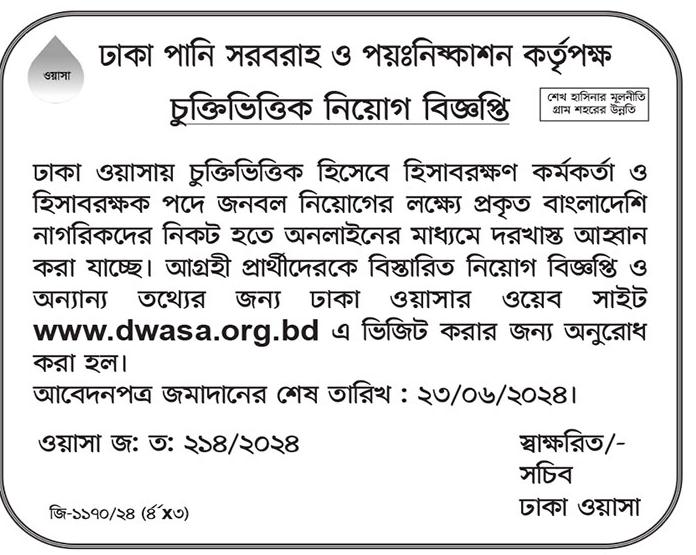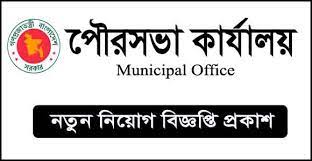Dhaka Water Supply and Sewerage Authority
ঢাকা পানি সরবরাহ ও পয়ঃনিষ্কাশন কর্তৃপক্ষ
Job Category: Govt. Job
Job Source: বাংলাদেশ প্রতিদিন
Posted On: 3 Jun 2024
Application Deadline:23 Jun 2024
Web: www.dwasa.org.bd

Welcome to our website bangladeshtodays.org. This is the best website online. Here you will get daily updates on all types of job news such as: E.g Job Vacancies in Public Sector, Private Sector, Corporate, Banking, NGO Jobs etc. You can select any type of job from the category option in the top menu of the website. You can apply for jobs directly on our website. There is a search option at the top of this website where you can search for jobs according to your requirements. If you have benefited even in the slightest from our website, then you can tell your friends, family and everyone else about this website. I hope you also benefit from this website. You can share this website post on Facebook, Instagram, Twitter or any other online platform if you want. Many people can benefit from your sharing. And if there is anything you want to know or understand, you can contact us by email on the contact page of this website. We will try our best to help you, thank you very much.
## Dhaka Water Supply and Sewerage Authority: Ensuring Sustainable Water Management
### Introduction
The Dhaka Water Supply and Sewerage Authority (DWASA) plays a critical role in the provision and management of water supply and sewerage services in Dhaka, the capital city of Bangladesh. As an autonomous body, DWASA is responsible for ensuring that the growing population of Dhaka has access to safe drinking water and effective sanitation services. This essay provides a comprehensive overview of DWASA, discussing its historical background, organizational structure, core functions, achievements, challenges, and future directions.
### Historical Background
#### Formation and Early Development
DWASA was established in 1963 under the East Pakistan Ordinance XIX, during the period when Bangladesh was still part of Pakistan. The primary aim of establishing DWASA was to manage the water supply and sewerage system in Dhaka, which was then a rapidly growing city. Initially, DWASA faced numerous challenges, including inadequate infrastructure, limited financial resources, and a lack of technical expertise.
#### Post-Independence Era
Following Bangladesh’s independence in 1971, DWASA underwent significant changes to address the increasing demand for water and sanitation services in Dhaka. The organization expanded its infrastructure, improved its management systems, and received international support for various development projects. Over the decades, DWASA has evolved into a more sophisticated and capable institution, striving to meet the water and sanitation needs of Dhaka’s burgeoning population.
### Organizational Structure
DWASA operates as an autonomous body under the Ministry of Local Government, Rural Development, and Cooperatives. The organizational structure of DWASA includes a Board of Directors, various departments, and specialized units.
#### Board of Directors
The Board of Directors is the highest governing body of DWASA, responsible for strategic decision-making and oversight. The Board is composed of representatives from the government, private sector, and civil society, ensuring a balanced approach to governance. The Managing Director, who is also a member of the Board, leads the executive management team and is responsible for the day-to-day operations of DWASA.
#### Departments and Units
DWASA is organized into several departments and specialized units, each focusing on specific aspects of water supply and sewerage management. Key departments and units include:
– **Water Supply Department**: Manages the production, treatment, and distribution of potable water across Dhaka.
– **Sewerage Department**: Oversees the collection, treatment, and disposal of wastewater and sewage.
– **Engineering Department**: Responsible for the design, construction, and maintenance of water and sewerage infrastructure.
– **Finance Department**: Manages financial planning, budgeting, and accounting functions.
– **Customer Service Department**: Handles customer inquiries, complaints, and service requests.
– **Research and Development Unit**: Focuses on innovation and the adoption of new technologies to improve water and sewerage services.
### Core Functions of DWASA
DWASA performs a wide range of functions aimed at ensuring sustainable water management and sanitation services in Dhaka. These functions can be broadly categorized into water supply, sewerage management, customer service, and environmental protection.
#### Water Supply
One of the primary functions of DWASA is to ensure a reliable and safe water supply to the residents of Dhaka. This involves several key activities:
– **Water Production**: DWASA operates multiple water treatment plants that process raw water from surface and groundwater sources. These plants are equipped with advanced technologies to remove contaminants and ensure water quality.
– **Water Distribution**: The treated water is distributed through an extensive network of pipelines, reservoirs, and pumping stations. DWASA continually works to expand and upgrade this network to meet the growing demand.
– **Quality Control**: Regular testing and monitoring of water quality are conducted to ensure compliance with national and international standards. DWASA has established laboratories for water quality testing and employs rigorous protocols to detect and address any issues.
#### Sewerage Management
Effective sewerage management is crucial for public health and environmental sustainability. DWASA’s sewerage management functions include:
– **Sewage Collection**: The organization operates a comprehensive sewerage network that collects wastewater from households, businesses, and industries. This network is continually being expanded to cover more areas of the city.
– **Wastewater Treatment**: DWASA runs several wastewater treatment plants that process collected sewage to remove harmful pollutants before releasing the treated water back into the environment. These plants use various treatment technologies, including biological, chemical, and physical processes.
– **Infrastructure Maintenance**: Regular maintenance and upgrading of the sewerage infrastructure are essential to prevent blockages, overflows, and other issues. DWASA conducts routine inspections and repairs to ensure the system’s efficiency and reliability.
#### Customer Service
DWASA places significant emphasis on customer service to ensure that the residents of Dhaka receive timely and efficient water and sewerage services. Key customer service activities include:
– **Billing and Payments**: The organization manages the billing process for water and sewerage services, offering multiple payment options to customers for convenience.
– **Complaint Handling**: DWASA has established a dedicated customer service department to address customer complaints and service requests promptly. This includes a hotline and online portals for easy access.
– **Community Engagement**: DWASA engages with the community through awareness campaigns, public meetings, and educational programs to promote water conservation and sanitation practices.
#### Environmental Protection
DWASA is committed to protecting the environment by ensuring sustainable water and sanitation practices. Key activities include:
– **Pollution Control**: The organization works to prevent pollution of water sources through stringent regulations and enforcement of wastewater discharge standards.
– **Resource Conservation**: DWASA promotes water conservation through various initiatives, including public awareness campaigns and the adoption of water-efficient technologies.
– **Sustainable Practices**: The organization is exploring the use of renewable energy sources and sustainable practices in its operations to minimize environmental impact.
### Achievements of DWASA
Over the years, DWASA has made significant progress in improving water supply and sewerage services in Dhaka. Some of the key achievements include:
#### Infrastructure Development
DWASA has undertaken extensive infrastructure development projects to enhance its capacity and service delivery. Key achievements include:
– **New Water Treatment Plants**: The construction of new water treatment plants, such as the Saidabad Water Treatment Plant, has significantly increased the production capacity of potable water.
– **Pipeline Expansion**: The expansion and upgrading of the water distribution network have improved coverage and reduced water losses due to leakage.
– **Sewerage Network Expansion**: The extension of the sewerage network has increased the coverage of wastewater collection and treatment services, benefiting more residents.
#### Improved Service Delivery
DWASA has made considerable strides in improving service delivery and customer satisfaction. Key achievements include:
– **Increased Water Supply Coverage**: The organization has expanded its services to reach more households and businesses, ensuring that a larger proportion of Dhaka’s population has access to safe drinking water.
– **Enhanced Water Quality**: Continuous monitoring and improvements in water treatment processes have resulted in better water quality, meeting national and international standards.
– **Efficient Complaint Handling**: The establishment of a dedicated customer service department and the implementation of a robust complaint handling system have improved response times and customer satisfaction.
#### Technological Advancements
DWASA has embraced technological advancements to enhance its operations and service delivery. Key achievements include:
– **GIS Mapping**: The implementation of Geographic Information System (GIS) mapping has improved the management of the water and sewerage network, enabling better planning and maintenance.
– **Smart Metering**: The introduction of smart metering technology has allowed for more accurate billing and better monitoring of water usage, reducing wastage and improving efficiency.
– **Automated Systems**: The adoption of automated systems for water treatment and distribution has increased operational efficiency and reliability.
#### Environmental Initiatives
DWASA has undertaken various initiatives to promote environmental sustainability. Key achievements include:
– **Wastewater Recycling**: The organization has implemented pilot projects for wastewater recycling, aiming to reduce water wastage and promote reuse in industrial and agricultural applications.
– **Green Infrastructure**: DWASA is exploring the use of green infrastructure solutions, such as rainwater harvesting and constructed wetlands, to enhance water management and reduce environmental impact.
– **Public Awareness Campaigns**: The organization conducts regular public awareness campaigns to educate residents about the importance of water conservation and proper sanitation practices.
### Challenges Faced by DWASA
Despite its achievements, DWASA faces several challenges in fulfilling its mandate. These challenges include:
#### Rapid Urbanization
Dhaka is one of the fastest-growing cities in the world, and rapid urbanization presents significant challenges for DWASA. Key issues include:
– **Increasing Demand**: The growing population of Dhaka leads to increased demand for water and sanitation services, straining existing infrastructure and resources.
– **Informal Settlements**: The proliferation of informal settlements and slums poses challenges for service delivery, as these areas often lack proper infrastructure and are difficult to access.
– **Resource Allocation**: Balancing the allocation of resources between expanding services to new areas and maintaining existing infrastructure is a complex task.
#### Financial Constraints
DWASA operates with limited financial resources, which can hinder its ability to effectively carry out its functions. Key financial challenges include:
– **Revenue Collection**: Ensuring timely and efficient revenue collection from customers is a challenge, particularly in areas with low payment compliance.
– **Investment Needs**: Significant investments are required for infrastructure development, technological upgrades, and maintenance, and securing sufficient funding can be difficult.
– **Operational Costs**: Rising operational costs, including energy expenses and maintenance costs, place additional strain on DWASA’s budget.
#### Environmental and Climate Challenges
Environmental and climate-related challenges have a direct impact on DWASA’s operations and service delivery. Key challenges include:
– **Water Pollution**: Pollution of surface and groundwater sources due to industrial discharge, agricultural runoff, and inadequate waste management affects the quality and availability of raw water for treatment.
– **Climate Change**: Climate change impacts, such as increased frequency of floods and droughts, pose significant risks to water supply and sewerage infrastructure and operations.

